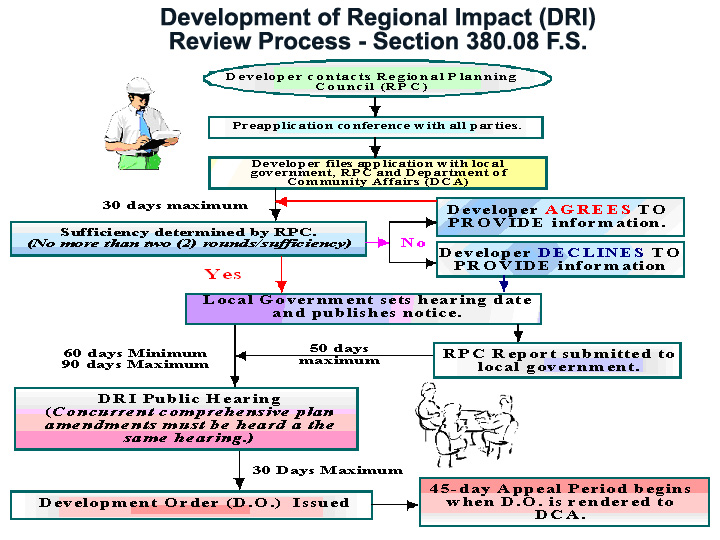A Development of Regional Impact (DRI) is defined under Section 380.06(1), Florida Statutes, as “any development which, because of its character, magnitude or location, would have a substantial effect upon the health, safety, or welfare of citizens of more than one County.”
The State DCA reviews developments of regional impact for compliance with state law and to identify the regional and state impacts of large-scale developments.
The State DCA makes recommendations to local governments for approving, suggesting mitigation conditions, or not approving proposed developments. A developer or the State DCA may appeal local government decisions to the Governor and Cabinet, sitting as the Florida Land and Water Adjudicatory Commission.

Whether or not a project meets the definition of a DRI is determined by State law, which establishes statewide guidelines and standards for certain types of development or mixed-use projects. Once the determination is made, a project is required to undergo an expensive, lengthy process requiring review and impact by numerous state and local agencies. The culmination of these reviews is a Development Order pursuant to Sections 380.032 and 380.06, Florida Statutes, that identifies the rights and obligations of the local government and the developer. It is a tri-party agreement, and may be enforced by the State, local government, and/or the developer. The agreement also requires public hearings and legislative approval by the local government wherein the property is located.
The agreement ensures that all infrastructures will be in place to offset the impacts, prevent or mitigate environmental impacts, and limits the size and location of a project, which often requires a phasing of the development. Because the DRI process is lengthy and extremely costly, most property owners seek to avoid the DRI process and if in doubt whether their proposed development must undergo the DRI process, they are authorized to challenge this designation through an administrative process seeking what is known as a Binding Letter of Interpretation. A developer may also believe that because a project has been approved or constructed prior to certain changes of the law, the project should be vested against DRI review. Contesting the applicability of the DRI statute requires that the developer obtain a binding letter of vested rights from the state.
Oftentimes after a DRI Development Agreement is approved, a developer may seek to have it amended to vary certain aspects, including timing of development, changing the size and mixture of land uses, transportation mitigation requirements and the like. A change to a DRI Development Agreement requires review by various governmental agencies and approval by the local government.
Our firm has assisted a multitude of developers around the state of Florida in maneuvering through the complex, time consuming and expensive bureaucratic maze of obtaining DRI approval, binding letters of intent, and binding letters of vested rights.

